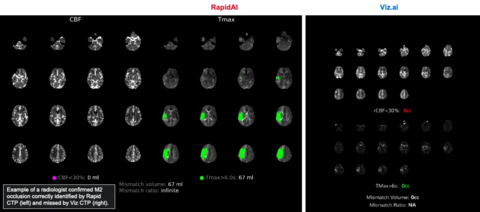RapidAI detects 33% more MeVOs than Viz.ai, with new real-world data presented at ESOC highlighting superior accuracy and deeper clinical insights
RapidAI, the gold standard and global leader in neurovascular AI-based clinical decision support and enterprise radiology solutions, today announced new study findings that underscore its continued leadership in stroke imaging. The findings emphasize that not all AI is created equal, with results showing that RapidAI’s clinically deep algorithms deliver superior accuracy in detecting medium vessel occlusions (MeVOs) compared to Viz.ai.
This press release features multimedia. View the full release here: https://www.businesswire.com/news/home/20250521545123/en/

Example of a radiologist confirmed M2 occlusion correctly identified by RapidAI CTP (left) and missed by Viz.ai CTP (right)
The data, presented as a late-breaking abstract at the European Stroke Organisation Conference (ESOC) 2025, analyzed 1,591 consecutive stroke cases at a comprehensive stroke center. Of the 1,122 eligible cases, RapidAI detected 93% (109) of MeVOs using CT Perfusion alone, compared to 70% (82) by Viz.ai.
“CT Perfusion is a powerful tool, but its full value is only realized when paired with high-performing software, especially in complex cases with smaller occlusions like MeVOs,” said Harmeet Sachdev, MD, lead investigator and neurologist. “RapidAI consistently identified more occlusions than Viz in this study, echoing what we saw in the DUEL study with large vessel occlusions. The story the data tells is clear: not all imaging tools are equally equipped to interpret complex stroke cases.”
MeVOs refer to occlusions in smaller, yet still crucial, arteries in the brain, such as the M2/M3 segments of the middle cerebral artery or the A1/A2 and P1/P2 segments of the anterior and posterior cerebral arteries. These blockages can cause severe damage if left untreated but are notoriously difficult to identify without high-performing imaging tools. The substantial number of MeVOs missed by the Viz.ai software could lead to significant delays in diagnosis and treatment.
The accuracy of Rapid CT and MR perfusion imaging for estimating core and penumbra has been extensively validated in the landmark clinical trials of DEFUSE 2, SWIFT PRIME, EXTEND-IA, and DEFUSE 3. RapidAI is the only software demonstrated to predict the subsequent infarct volume based on initial perfusion imaging. In addition, RapidAI is the only perfusion software with an FDA indication for selecting patients for mechanical thrombectomy.
“These real-world clinical findings validate what sets RapidAI apart. Deeper clinical algorithms that not only detect more but empower providers with greater clarity and confidence,” said David Stoffel, MD, chief business officer at RapidAI. “Accurate perfusion imaging is essential for identifying subtle but serious strokes. Without it, critical cases can go unrecognized, delaying treatment when every minute counts.”
The study, titled “AI Detection of Medium Vessel Occlusions: Evaluating Performance of RapidAI vs Viz.ai CT Perfusion in 1,591 Consecutive Code Strokes”, was presented at ESOC 2025.
About RapidAI
RapidAI is the world leader in AI-driven medical imaging analysis and coordinated care. With the industry’s most validated clinical AI platform, we empower care teams to rapidly, precisely, and confidently manage life-threatening conditions. Trusted by thousands of hospitals in 100+ countries, RapidAI delivers the deepest level of clinical decision support on the market to help accelerate the time to treatment and enhance patient outcomes. We go beyond the algorithm to drive care team collaboration and efficiencies that expand access to life-saving interventions. At RapidAI, we establish new standards for care teams and the patients they treat.
View source version on businesswire.com: https://www.businesswire.com/news/home/20250521545123/en/
Contacts
RapidAI Media Contact:
Jessica Stebing
Group Manager, Marketing Communications
stebing@rapidai.com






